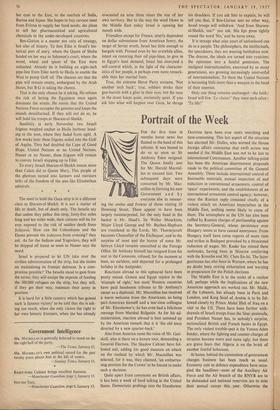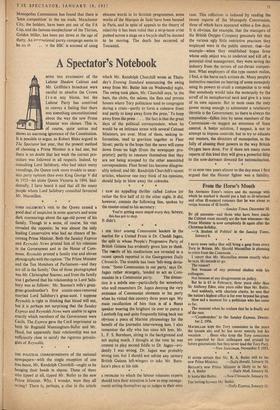Portrait of the Week
Reactions abroad to this upheaval have been pretty mixed. Greece and Egypt rejoice in the 'triumph of right,' but most Western countries have paid handsome tributes to Sir Anthony's career as a diplomat. Mr. Macmillan has received a warm welcome from the Americans, as being part-American himself and a war-time colleague of Mr. Eisenhower's; he has even had a felicitous message from Marshal Bulganin. As for his ad- ministration, reaction abroad is best summed up by the American remark that it is 'the old team directed by a new quarter-back.'
Also from America came the voice of Mr. Gait- skell, who is there on a lecture tour, demanding a General Election. The Shadow Cabinet have fol- lowed suit, adding for good measure an attack on the method by which Mr. Macmillan was selected, for it was, they claimed, 'an embarras- sing position for the Crown' to be forced to make such a decision.
Quite apart from comments on British affairs, it has been a week of hard talking in the United States. Democratic probings into the Eisenhower Doctrine have been ever more searching and time-consuming. This last aspect of the situation has alarmed Mr. Dulles, who warned the House foreign affairs committee that swift action was needed if the Middle East was not to be lost to international Communism. Another talking-point has been the American disarmament proposals made to the political committee of the General Assembly. These include international control of fissionable materials, mutual inspection of and reduction in conventional armaments, control of 'space' experiments, and the establishment of an international armament control agency; however, since the Russian reply consisted chiefly of a violent attack on American imperialism in the Middle East, nothing seems likely to come of them. The atmosphere at the UN has also been ruffled by Russian charges of partisanship against the Secretary-General, whose persistence over Hungary seems to have caused annoyance. From Hungary itself have come reports of more riots and strikes in Budapest provoked by a threatened reduction of wages. Mr. Kadar has missed these outbreaks, having been in Moscow conferring with the Kremlin and Mr. Chou En-lai. The latter gentleman has also been in Warsaw, where he has no doubt been mixing exhortation and warning in preparation for the Polish elections.
The Middle East is in the midst of a restless lull, perhaps while the implications of the new American approach are worked out. Mr. Malik, of the Lebanon, has already been in Paris and London, and King Saud of Arabia is to be fol- lowed closely by Prince Abdul Illah of Iraq on a visit to the US. There have been further with- drawals of Israeli troops from the Sinai peninsula, and President Nasser has, to nobody's surprise, nationalised British and French banks in Egypt. The only violent trouble-spot is the Yemen-Aden border, where the fighting and counter-charges of invasion become more and more ugly; but there are grave fears that Algeria is on the brink of another fearful holocaust.
At home, behind the commotion of government changes business has been much as usual. Economy cuts in defence expenditure have occu- pied the headlines—most of the Auxiliary Air Force and the Air branch of the RNVR are to be disbanded and national reservists are to miss their annual camps this year. Otherwise the Monopolies Commission has found that there is 'keen competition' in the tea trade. Manchester City, the holders, have been put out of the FA Cup, and the famous steeplechaser of the Thirties, Golden Miller, has been put down at the age of thirty. An inli-rnational purity campaign seems to be on th , )1- the BBC is accused of using obscene words in its Scottish programmes, some works of the Marquis de Sade have been banned in Paris, and in spite of appeals to the theory of relativity it has been ruled that a strip-tease artist pushed across a stage on a bicycle shall be deemed to be moving. The death has occurred of Toscanini.



































 Previous page
Previous page